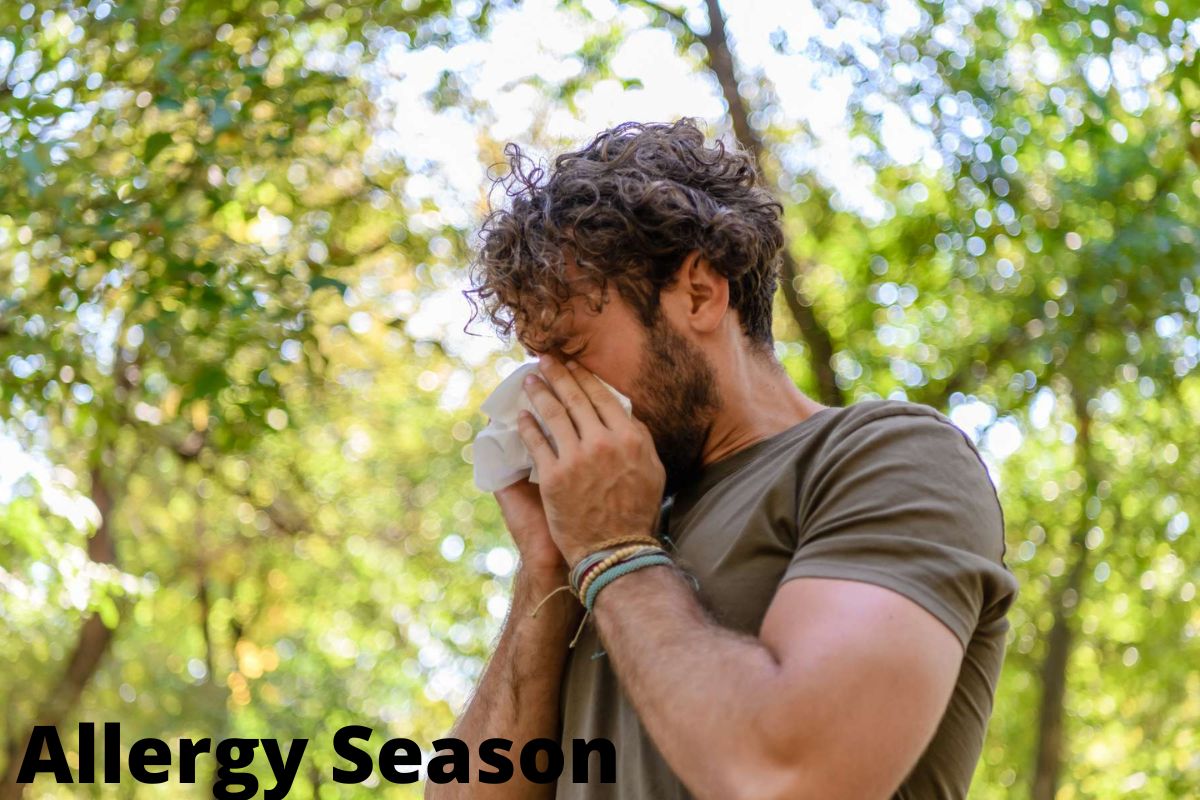Once again, you’re sitting outside in the sunshine, enjoying the warmth, when you suddenly begin to feel…itchy. If that itch doesn’t go away in an hour, you’ll be going to the drugstore to get Zyrtec due to a full-blown sneeze attack with watery eyes and congestion.
Around 60 million Americans suffer from allergic rhinitis each year because of seasonal allergies, or an allergic reaction to the tree and grass pollens that are in the air during the spring and summer.
According to longtime allergist Fred Little, a clinical associate professor of medicine at the Boston University School of Medicine and director of the Boston Medical Center allergy-immunology fellowship, climate change, and recent dry spells are to blame for this year’s particularly bad allergy season in the Northeast.
When it comes to allergies and what you can do to alleviate their symptoms, we talked to Little, who is an expert in the field.
What Causes Hay Fever?
As Allergy UK puts it: “Hay fever is an allergic reaction that occurs when the body produces IgE antibodies (allergy antibodies) to particular chemicals. In addition to weed and grass pollens, tree pollens (February to June) and grass pollens (June to September) can also produce hay fever. In the previous five years, according to the charity, up to 37% of people have acquired symptoms.
How Can Allergies Affect Your Skin?
Pamela Friedman, CEO of CV Skinlabs, argues that “the immune system overreacts when an allergen enters your system, attacking it like it would bacteria or a virus.” Sneezing, itchy eyes, and even breathing difficulties can result as a result of the histamine released as a result.
As Friedman points out, even if you haven’t come into contact with an allergen, your body’s reaction to it can affect your skin. The immune system is linked to skin problems including eczema, psoriasis, and hives, so they are more likely to flare up at the same time as your allergies.
Allergens like pollen can aggravate these symptoms by irritating the delicate skin surrounding the eye area. Your skin’s protective barrier may be compromised, resulting in increased sensitivity to the products you use daily.
Allergy sufferers should take extra care of their facial skin since it is more delicate than any other part of their body, according to London Premier Laser and Skin Clinics’ founder and skin specialist Lucy Xu.
When skin becomes dry and irritated, it loses its natural ability to retain moisture, which makes it feel harsh to the touch. Over time, this can lead to breakouts and the development of wrinkles and fine lines. Your scalp can be affected by skin allergies, causing it to itch or dry out more than usual.

How to Allergy-proof Your Skin:
Take antihistamines, but do more than that.
Dr. Justine Hextall, a dermatologist and consultant dermatologist, says that antihistamines can help alleviate itching, but “topical therapies are usually required.” The itchier the skin gets, the more histamine is released when scratching occurs. Because of this, it is vital to alter your skincare routine to lessen the itchiness and irritation that your skin is experiencing.”
Ensure that your skin is properly hydrated.
According to Xu, “I would recommend cleaning your skin properly morning and evening to clear yourself of any pollen particles on your face”. Finally, use a night cream or overnight mask to ensure that your skin is well-moisturized at night.” Med8’s CalmWise Serum and Dr.Jart+ Cicapair SleepAir Intensive Mask are two excellent options.
Preserve the health of your eyes by wearing sunglasses.
When it comes to eyelids, “it’s crucial to take care of the delicate skin,” advises Hextall. “Don’t use any strong cleansers or makeup removers.” Sensibio H20 from Bioderma is recommended for removing eye make-up, while La Roche-Toleriane Posay’s Ultra Eyes from Bazaar is recommended for soothing sensitive skin around the eyes. Optrex’s Itchy Eye Drops are a good option if you’re looking for a solution to your dry eyes.
Make sure to read the labels on your skincare products.
“Fragrance is the number one cause of severe skin responses to cosmetics,” according to the sensitive skin skincare brand Green People, which many skincare experts concur with. You should avoid synthetic and natural perfumes if you have sensitive skin.
Essential oils, colorants, and lanolin can all make your skin more sensitive, and alcohol, which dissolves the skin’s lipid protective layer, can do the same.
While the foregoing may sound confusing, many sensitive-skincare companies now prominently display their “free-from” promises on their bottles. Make sure your current regimen isn’t causing your skin any extra problems by checking the ingredients list and searching for any terminology you don’t understand.
Try one of the starter kits for sensitive skin listed below for a simple, step-by-step regimen:
‘Law & Order: Special Victims Unit’ Season 24: Release Date Status, Time, Spoilers and All About!
If Your Allergy Meds Don’t Work
Antihistamines, nasal sprays (over-the-counter and prescription), and eye drops are all options for relieving allergy symptoms. Rhonda J. Myers, MD, Ph.D., an allergist with Providence St. Joseph Hospital in Orange County, California, told Health that oral antihistamines assist the itchy, sneezy, runny, and congested nose, whereas intranasal antihistamines aid the itchy, sneezy, runny and congested nose.” There is also the option of using intranasal corticosteroids to treat all of these symptoms, but they must be used every day to be effective, Dr. Myers added.
If your typical medications aren’t doing the trick, it’s time to schedule another appointment with your doctor. When it comes to diagnosing an allergy or asthma attack, Dr. Fonacier says, “An allergist has extensive training and experience to accurately identify your disease.” As a result, they can help you identify your allergy triggers, give you guidance on how to prevent them, and even discover possible consequences early.
One possible explanation for the failure of your medications to alleviate your symptoms is that you were misdiagnosed (you have a sinus infection rather than seasonal allergies), were exposed to an excessive amount of the allergen, or were unable to avoid exposure. Dr. Fonacier also cautioned that you may have started your treatment too late. It doesn’t matter what’s causing the sneezing; your doctor can help you get to the bottom of it and perhaps find some relief.
How To Stay Ahead of Allergy Season
First, if you’ve felt allergy symptoms before but haven’t been diagnosed, note trends. If you’ve felt bad around March for the last few years and had the same symptoms—a runny nose, sneezing, congestion, or itchy or watery eyes—you should see an allergist before the next allergy season.
Janna Tuck, MD, an ACAAI spokesperson and allergist in Santa Fe, New Mexico, told Health, “If you constantly think you have a cold in March but remember having three of the same symptoms last year, you may have allergies.”
Regular allergy sufferers want to prevent responses. Keep a watch on pollen counts (local weather reporters broadcast them on-air) and, if you’re traveling, pollen counts in your destination town or city.
By taking your allergy medication on a schedule, you can maintain your immune system robust and avoid needing extra medication.
Seasonal allergies aren’t life-threatening, although they can be severe if you have asthma.
Dr. Tuck says asthmatics can have significant allergy problems. “If you have asthma and have trouble breathing or cough a lot, visit a doctor, be diagnosed, and get on a solid treatment plan, which may include regular allergy shots to avoid asthma attacks from allergies.”
How to Tell the Difference Between Allergies and Covid-19?
During allergy season, it’s hard to tell allergy symptoms from minor COVID symptoms. People with allergies shouldn’t have a fever or the high fever associated with COVID, nor the exhaustion. People with allergic asthma can develop respiratory symptoms during allergy season, making it harder to distinguish. Asthmatics should be able to distinguish COVID-19 pneumonia symptoms from asthma symptoms.
If you like this article follow our website digitalnewsexpert.com and don’t forget to follow our social media handles


Leave a Reply